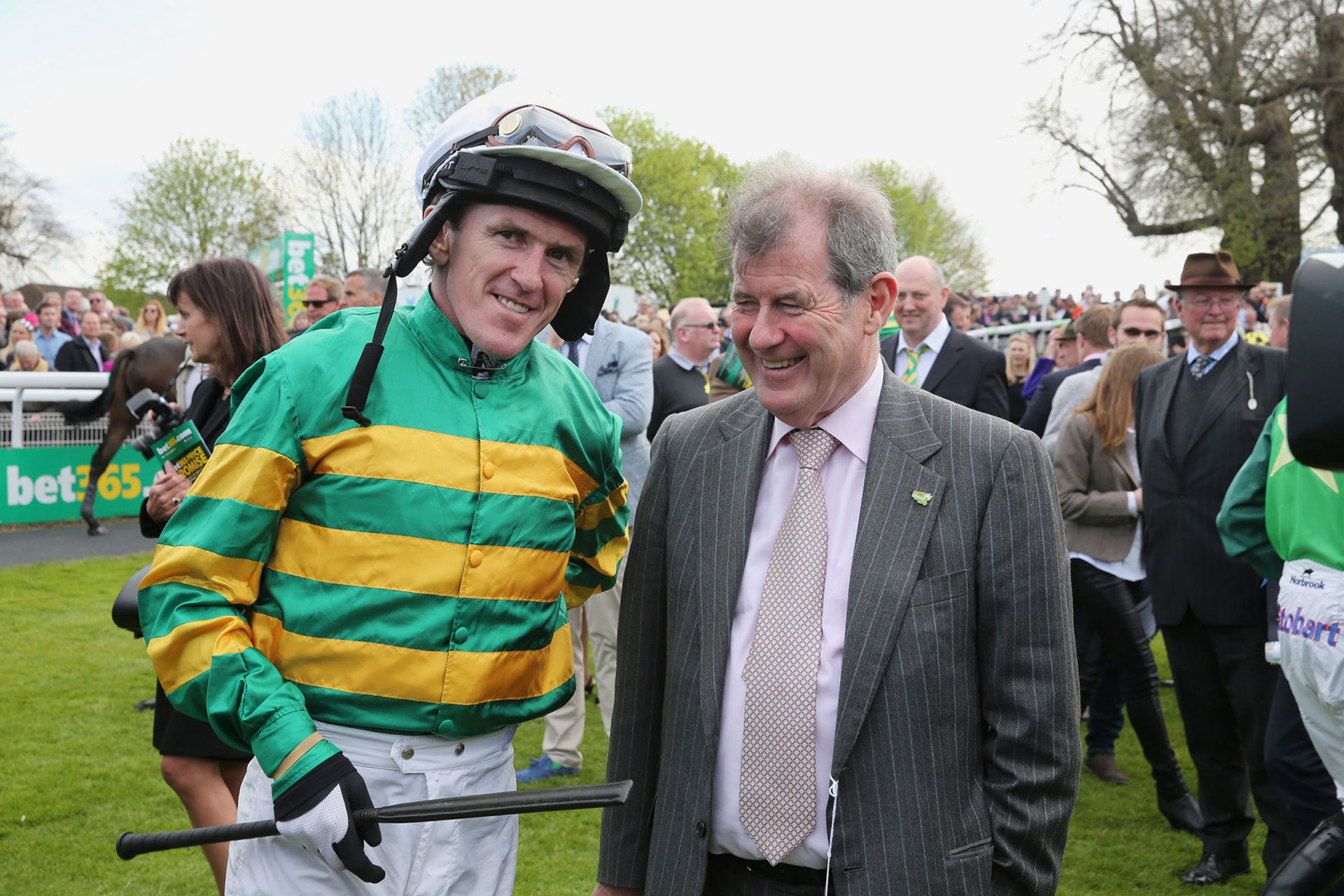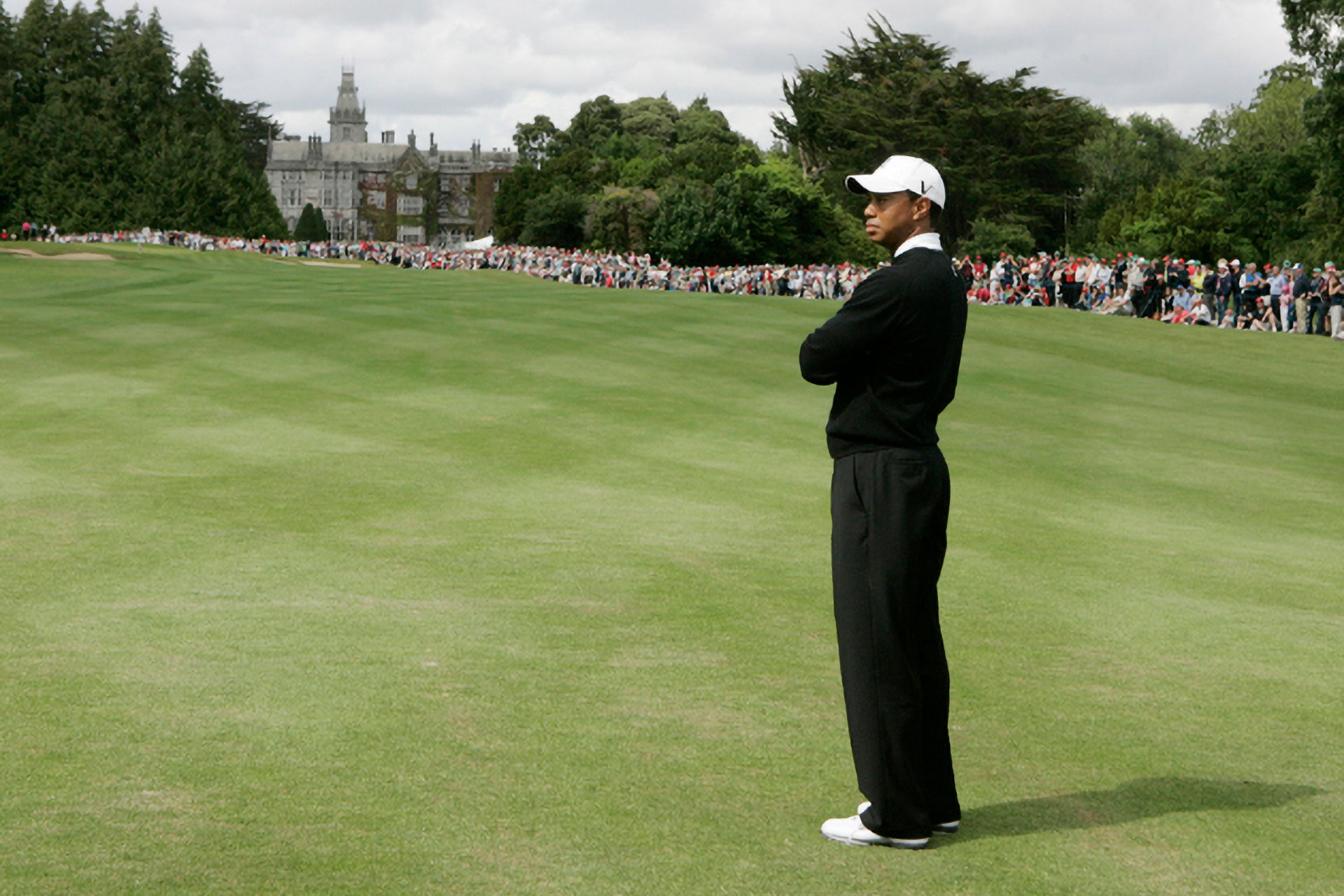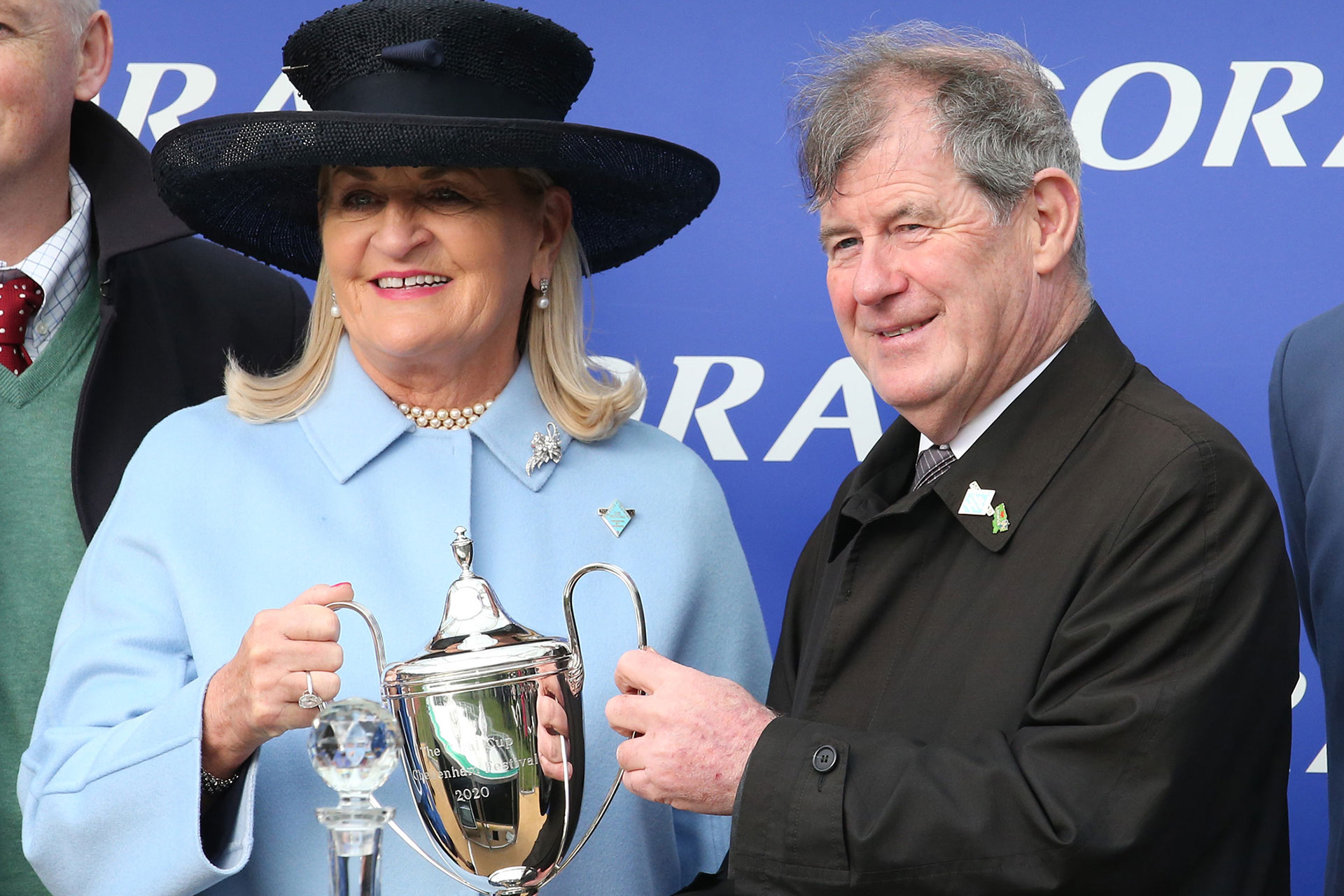JP McManus
Making Memories
JP McManus is happy to reminisce having broken through the 4,000 winner barrier as an owner but he’s not done yet
Words: David Coughlan • Photos: Caroline Norris / David Betts
JP McManus nods at the white boards at the other end of the office. It’s late September in Martinstown and the rain is coming down in great grey sheets outside.
“Our horses in training,” he says, gesturing at the names of hundreds of thoroughbreds and their respective trainers. When asked the number of horses he replies, “Marian Finucane once asked me how many we have and I said I didn’t know… but I’d know if there was one missing!”
In amongst the list is Chantry House, the chaser that brought up his 4,000th winner as an owner last season, something he could never have imagined when buying Cill Dara nearly 50 years ago.
“It was gambling that led me to horses and then when I had a few quid, I fancied owning a horse. It just developed. There was no great plan. It just fell into place,” McManus says.
Owner, gambler, bookmaker, benefactor, backgammon master, hurling fanatic, club chairman and county sponsor, McManus has lived this sporting life. He briefly tried his hand as a work rider too, but more of that later.
Down the years McManus has owned some of the greatest horses to ever jump an obstacle, many of them currently housed in his back garden.
“We’ve had some unbelievable days. From Cill Dara and Mister Donovan to Istabraq, Don’t Push It, Synchronised, Baracouda, Buveur D’Air, Minella Times and so many more. We’ve been lucky.”
The nearby town of Bruff provides the first sign that you’re in McManus country. A mural of Istabraq is painted on the side of Clancy’s Bar, just a few kilometres from Martinstown, the palatial family home and estate he bought with his beloved wife Noreen and where they raised their three children, John, Sue Ann and Kieran.
There are plenty of Limerick flags still flying too after the completion of the All-Ireland three-in-a-row and McManus has played a significant role in the county’s success as team sponsor, even though he’s actually a Dub…
“It’s not something he advertises,” says Noel Earlie, the former principal of CBS Sexton Street, “but it is true.”
McManus was a pupil at Sexton Street himself and now sponsors an annual scholarship scheme at the school. He was born in the vicinity of Croke Park, a place close to his heart. The eldest of five brothers (JP, Kevin, Owen and twins Gerry and Michael), he moved with the family when he was “maybe a year and a half”, first to Ballygar in County Galway and then to the Ballysheedy area of Limerick, where he grew up and where his heart and soul remains.
From there to here has been quite the journey and reminders of a life less ordinary are dotted around the one-storey office complex. Photos of McManus on the golf course and the racetrack, a portrait of AP McCoy and the green and gold of South Liberties GAA club are here, there and everywhere.
Purchased in November 1976, Cill Dara was the first to run in those colours. She finished down the field in a maiden hurdle at Fairyhouse on January 26, 1977, in a race won by Clem Magnier’s Biscuit, but better days weren’t far away. In July of that year she won at Naas with McManus taking a “little” out of the satchels of his betting ring colleagues. Then came a memorable Cesarewitch win at The Curragh when favourite in October 1977.
“I don’t want to be somebody who withers away. I want to live every day like it’s my last and someday I’ll be right”
“I was chairman of South Liberties for three years and those colours mean a lot to me. Cill Dara was very special because when she won the Cesarewitch, it was the only time my dad saw me have a winner. He died (in September 1978) when he was just 63. He wasn’t the healthiest in the world, obviously, but he got to The Curragh that day to see the mare win. We got a great lift out of that.”
After leaving school, McManus worked with his father Johnny, driving bulldozers and operating machinery. He even cleared the site for what is now Martinstown when it was owned by Mrs June McCalmont.
“If I knew then that I would one day own the place I might have done a better job,” he jokes.
Gambling had him from an early age and he says it was only the introduction of a punitive betting tax that stopped him from addiction. His relationship with his dad was always good, despite their differing opinions on gambling. His mother Bridie played cards and loved a bet and she gave him money to restart bookmaking again after he went broke a couple of times.
“My dad wasn’t keen that I go into bookmaking and gambling. He’d seen too much of it go wrong. When I was younger and in my teens, my mam and dad saw a compulsive gambler and I suppose I was. I’d bet on anything. I’d work all week and the highlight then for me was going into the betting office on a Saturday afternoon and having some bets.
“Luckily enough they brought in a punitive tax of 20 per cent that had to be paid on all bets. It meant that if you were having an even five-pound bet you had to put on six to win four. I quit overnight. But at least it showed I had the discipline to quit.
“At the end of the day my dad was only watching my back. He often said, ‘If you don’t get into debt, you can always make a comeback.’
“There was a saying among card players that money was made round to go around but my mam had her own take on that: ‘Money was made flat to build upon.’ I always thought, growing up, that my dad was hard and my mam was soft, but I realised later in life it was my father who was soft and my mother took the harder line.
“I was 21 (when starting as a bookmaker). I’m sure like any parent you’d be concerned about your son at that age. The youngest of my children is over 40 and I still worry about them. I can only imagine how he felt.”
His status as a fearless gambler soon became legendary, a reputation enhanced after being dubbed The Sundance Kid by the great sportswriter Hugh McIlvanney in The Observer. “You could be called a lot worse,” he says, smiling.
In the world of bookmaking, McManus was Sundance to the Butch Cassidy of his friend Jimmy Hayes. Together they formed a formidable gambling partnership taking and making bets. “Jimmy was excellent on the form book. Experience helps, yes, but enthusiasm makes up for a lot of mistakes in life. We made lots of mistakes, but we’d lots of enthusiasm.”
Mister Donovan gave him his first Cheltenham Festival winner in 1982 and kept him afloat with a bet that reportedly yielded around £250,000. It was a punt that may even have been make-or-break for him.
“It was a relief, I didn’t have a great day the day before. I don’t know if I’d have had any of the other winners had he not won. It was kind of crucial at that time. I think he was about 12/1 in the morning and he ended up 9/2. Tells its own story.”
For many years his reply when asked about various coups he’s been linked with was to say nothing. The best strokes were those nobody knew anything about. And besides, they couldn’t be spoken about in case they were needed again.
“I am given credit for some things that I never actually achieved.
One notable coup was Bit Of The Action at Down Royal in 1983. The suggestion was that the gamble took advantage of racing being cancelled in England with widespread moderate bets placed in Britain. With insufficient communication to the track, the unsuspecting betting shops were unable to lay off the bets and were reportedly hit for a six-figure sum. Smiling, he neither confirms nor denies his involvement.

AP McCoy’s reward for winning the Grand National in 2010 on Don’t Push It was to partner with Tiger Woods in the JP McManus Pro-Am at Adare Manor later that year (CN)


Noreen has been a constant through the highs and lows (CN)
“Experience helps, yes, but enthusiasm makes up for a lot of mistakes in life. We made lots of mistakes, but we’d lots of enthusiasm”
“In my younger life we had a lot of fun. Nowadays it is more difficult to get on and I think I can spend my time better rather than trying to plan a coup for what you’d get out of it.”
Over the course of the six decades and 4000-odd winners, there have been many more memorable days. Grand Nationals, Gold Cups, Champion Hurdles and everything in between. Too many to recall, but one that sticks in his mind is the day Istabraq won at Tipperary in October 1997, in a race he sponsored that was named in memory of his father.
“That day I led Istabraq in with my mam. She was very proud and she so enjoyed the day. It’s great to have lasting memories of your parents, they mean so much. Sometimes maybe we don’t fully appreciate them when they are with us.”
Bridie died in 2003, but she was around to see all of Istabraq’s glorious achievements. In a lifetime filled with great horses, Istabraq is still arguably McManus’s greatest. Four Cheltenham Festival wins, three Champion Hurdles and a jumping action that would take your breath away, he is enjoying a long and happy retirement in Martinstown rising 31, and the owner sees him regularly.
The Istabraq story will always bring back memories of John Durkan too for McManus. He remains very grateful to Timmy Hyde, who purchased Istabraq for him, with the horse being sent to Durkan, Timmy’s son-in-law to train. Following a diagnosis of leukaemia however, John suggested Aidan O’Brien should train the horse on a caretaker basis until he recovered.
The former jockey sadly died a few days before Istabraq won his first Irish Champion Hurdle in 1998 and as the star hurdler went on to become a Cheltenham legend, he was never far from McManus’s thoughts.
“They were emotional occasions, tinged with sadness and joy. The memory of John Durkan would live anyway, but while Istabraq was around, you couldn’t think of Istabraq without thinking of John.”
There have been many more tough days, on and off the track. The death of John Thomas McNamara hit him hard and last year his family was engulfed in tragedy with the death of his daughter-in-law Emma. “She was an amazing girl and we were so blessed to have had her in our lives.”
As a racehorse owner, losing Gold Cup winner Synchronised at Aintree in 2012 has stuck with him, as has the day Mick Fitzgerald’s career ended in a brutal fall. “They were sad days,” he says, quietly.
His own health is good these days. He made a full recovery from a cancer scare in 2009. “I had the operation in 2009 and thankfully I’ve never had a problem since. They take a little bit out of you, but it gives you back a lot more. You’re thinking, ‘Maybe I’ve got time I wasn’t meant to have.’
“I still get a great buzz out of a Cheltenham winner. Do I look forward to Cheltenham? I tend to let things creep up on me more than look forward to it. I’m getting to an age now where I take every day as it comes. Enjoy the moment and you’ll have a nicer life. You can’t be wishing your life away.”
Come next March he will be 72 and is moving more freely than many of his old South Liberties contemporaries, some of whom are paying the price for glory on the hurling field in their knees and hips.
He’s due to play golf at the Dunhill Championships with Padraig Harrington the following week but his game just isn’t clicking at the moment.
“I stopped off in Portugal for a couple of rounds on the way back from Switzerland and…” he shakes his head wearily, “not good.”
For many years he has run a charity golf tournament (the JP McManus Pro-Am) that has raised millions for local causes and last summer the biggest names in golf descended on Adare Manor once again. When McCoy finally won the Grand National for him on Don’t Push It in 2010, his reward was a round with Tiger Woods at the pro-am. This time the GAA schedule didn’t allow for a similar arrangement with Limerick’s hurling heroes. He has sponsored Limerick for many years and was pleased to see Shane Lowry enter into a similar arrangement with Offaly more recently.
A lesser well-known part of his sporting story is his riding work for trainer Edward O’Grady in the late 1970s. He admits it was rarely a pleasurable experience.
“I went to Edward’s for a while. I was hoping to ride in a Madhatters’ race. I didn’t know too much about riding. I’d sat across the milk pony a few times, galloped around the field bareback, but not much more. I got to a stage when I was at Edward’s that each time I rode I was glad it was over. I must have lost my nerve. I got off one day and I said, ‘You know, I’m coming down here and I’m actually glad when I’ve finished, so there’s something wrong.’ That was probably around 1980 and I never sat on a horse from that day to this.”
There have been other mishaps down the years and like any successful individual, he’s had his critics too, but he has no time for regrets.
“We move on from them. Any regrets? If I have, I’ve forgotten them.” One venture he’s unlikely to repeat is that of Premier League football club owner after his time in the Manchester United boardroom went sour.
“That would be a ‘no’ anyway. It was a part of my life for a while, but for something that was a bit of pleasure at the start, it ended not being so pleasurable. I couldn’t get far enough away from it quickly enough.
“When the fans stopped the racing that day in Hereford (in 2004), I said, ‘I’ve had enough.’ But my brother Gerry is a big follower of them, he goes to the matches, he’s a diehard Man United fan.”
He has no ill-will towards Alex Ferguson and says they’re on speaking terms after their much-publicised fallout during that period. “If I meet him at the races, we’d say hello. Life’s too short.”
When it comes to racing, he still has a few trophies he’d like to get his hands on. “There’s a few left on my bucket list. I’d like to win the Kerry National. Never won it. The Champion Chase is a race I’d also like to win.”
His business interests keep him away from Martinstown for large parts of the year and his primary residence is in Geneva in Switzerland. He also part-owns the Sandy Lane resort in Barbados with Dermot Desmond and John Magnier and his commitments mean he doesn’t see as much hurling as he would like.
“I’m sorry to admit I haven’t been to one South Liberties game this year,” he says, grimacing.
McManus is a regular in the newspaper rich lists and his wealth is estimated at around €1bn, but he has no plans to retire. Even if it might help his golf game.
“I don’t think you should ever retire. If you’re doing something you don’t like doing, retire. But if you’re doing something you like, why would you retire? Why would you want to retire? I think you would wither away. And I don’t want to be somebody who withers away. I want to live every day like it’s my last and someday I’ll be right.”
His charity work is extensive and his patronage of jump racing unrivalled with horses in training all over Ireland and Britain, and a couple in France. He’s also a loving grandparent to nine grandchildren which takes up a considerable amount of his and Noreen’s time.
“Am I religious? I’m not a fanatic, but I go to mass most Sundays if that’s what you’re asking. But I could be thinking of anything during mass,” he says.
So what could be going through that great mathematical mind of John Patrick McManus at such times of reflection? The Ryder Cup in Adare Manor in 2027? Limerick manager, John Kiely’s next full-forward line? The handicap marks for the Grand Annual? Chantry House’s route to the Grand National? Or possibly even one more big betting coup? One to rival his old pal Barney Curley and one that may be hidden somewhere on those white boards in the office at Martinstown.
“You’d never know. I might have to revert to that,” he says, laughing. “I better get working on it.”

